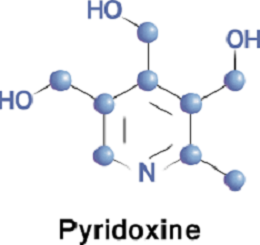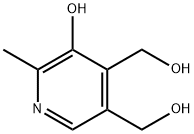What is pyridoxine?uses,Pharmacodynamics,Vitamin B6 deficiency
pyridoxine, also known as Vitamin B6, is a water-soluble vitamin that your body needs for several functions.It’s significant to protein, fat and carbohydrate metabolism and the creation of red blood cells and neurotransmitters.Your body cannot produce vitamin B6, so you must obtain it from foods or supplements.
Most people get enough vitamin B6 through their diet, but certain populations may be at risk for deficiency,so consuming adequate amounts of vitamin B6 is important for optimal health and may even prevent and treat chronic diseases.

Uses
Pyridoxine (vitamin B6) is used to prevent or treat low levels of vitamin B6 in people who do not get enough of the vitamin from their diets. Most people who eat a normal diet do not need extra vitamin B6. However, some conditions (such as alcoholism, liver disease, overactive thyroid, heart failure) or medications (such as isoniazid, cycloserine, hydralazine, penicillamine) can cause low levels of vitamin B6. Vitamin B6 plays an important role in the body. It is needed to maintain the health of nerves, skin, and red blood cells.
Pharmacodynamics
Vitamin B6 (pyridoxine) is a water-soluble vitamin used in the prophylaxis and treatment of vitamin B6 deficiency and peripheral neuropathy in those receiving isoniazid (isonicotinic acid hydrazide, INH). Vitamin B6 has been found to lower systolic and diastolic blood pressure in a small group of subjects with essential hypertension. Hypertension is another risk factor for atherosclerosis and coronary heart disease. Another study showed pyridoxine hydrochloride to inhibit ADP- or epinephrine-induced platelet aggregation and to lower total cholesterol levels and increase HDL-cholesterol levels, again in a small group of subjects. Vitamin B6, in the form of pyridoxal 5'-phosphate, was found to protect vascular endothelial cells in culture from injury by activated platelets. Endothelial injury and dysfunction are critical initiating events in the pathogenesis of atherosclerosis.
Vitamin B6 deficiency
Human studies have demonstrated that vitamin B6 deficiency affects cellular and humoral responses of the immune system. Vitamin B6 deficiency results in altered lymphocyte differentiation and maturation, reduced delayed-type hypersensitivity (DTH) responses, impaired antibody production, decreased lymphocyte proliferation and decreased interleukin (IL)-2 production, among other immunologic activities.
Metabolism
Pyridoxine is a prodrug primarily metabolized in the liver. The metabolic scheme for pyridoxine is complex, with formation of primary and secondary metabolites along with interconversion back to pyridoxine. Pyridoxine's major metabolite is 4-pyridoxic acid.
Toxicity
Oral Rat LD50 = 4 gm/kg. Toxic effects include convulsions, dyspnea, hypermotility, diarrhea, ataxia and muscle weakness.
You may like
See also
Lastest Price from Pyridoxine manufacturers

US $9.90/KG2025-04-21
- CAS:
- 65-23-6
- Min. Order:
- 1KG
- Purity:
- 99%
- Supply Ability:
- 10 mt

US $65.00/kg2025-04-15
- CAS:
- 65-23-6
- Min. Order:
- 1kg
- Purity:
- 99%
- Supply Ability:
- 5000kg/week


